False Claims Act Violations: Real-Life Examples and Key Insights
Let’s dive deeper into what the FCA is, some examples of FCA violations, and the penalties that came with them.

In 2024, the U.S. The Department of Justice (DOJ) secured more than $2.9 billion in settlements and judgements due to fraudulent claims. While over half of 2024’s False Claims Act settlements involved healthcare providers, other major sectors also faced serious consequences and penalties. Such as defense contracting, education, and technology.
While dealing with claims, it’s important to keep in mind the legalities involved. We understand that professionals want to collect on their revenue quickly. But disregarding federal regulations and cutting corners can result in more than just a slap on the wrist.
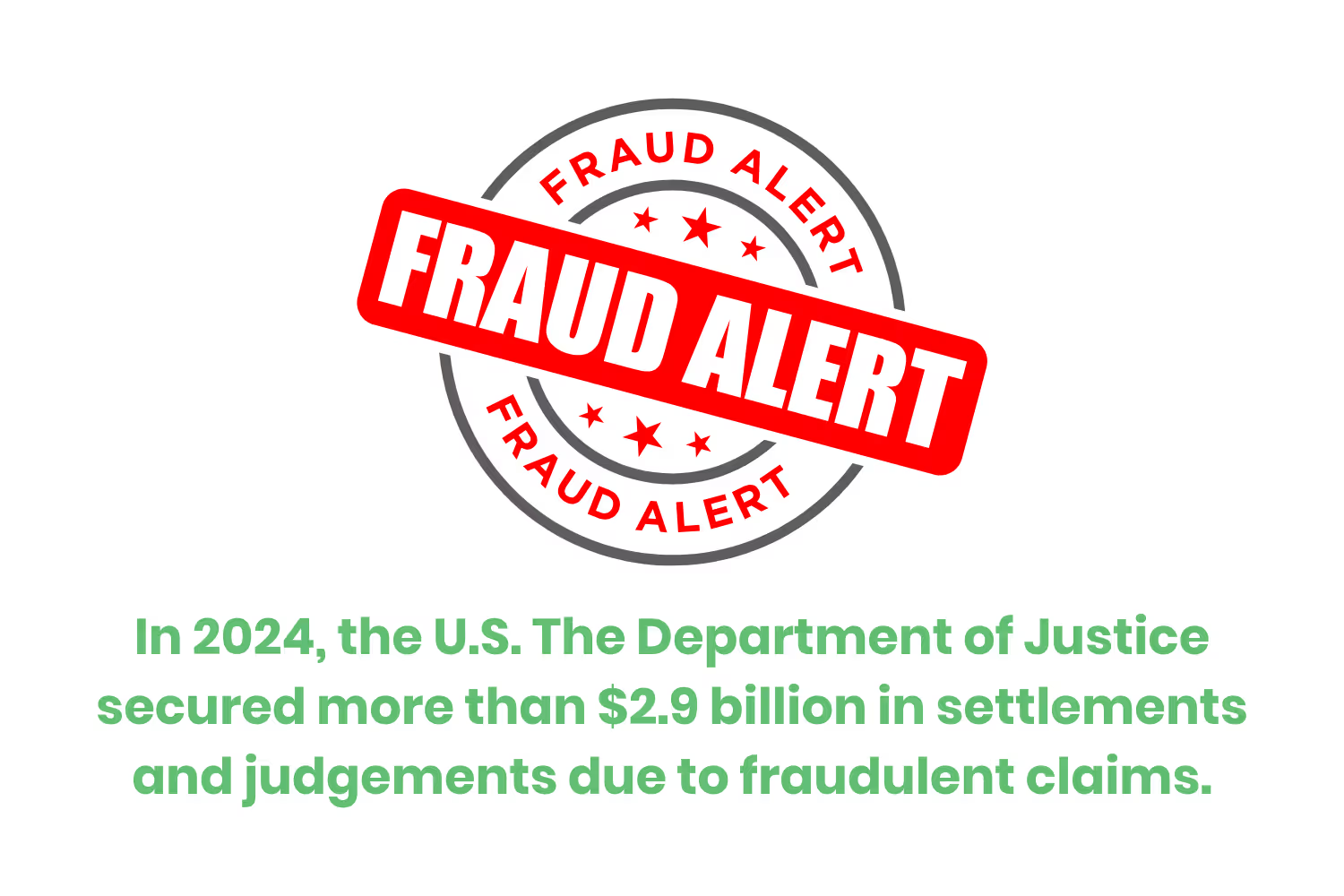
Even a single billing error, while unbeknownst to your employee, can trigger a federal investigation under the False Claims Act (FCA). A violation of this magnitude can result in millions in settlements, ruined reputations, and more.
Let’s dive deeper into what the FCA is, some examples of FCA violations, and the penalties that came with them.
What is the False Claims Act?
The False Claims Act (FCA) is a federal statute originally enacted in 1863. Its introduction was in response to defense contractor fraud during the American Civil War. During the war, contractors would sell damaged goods to the Union Army. Including horses and mules in poor health, faulty rifles, and rancid provisions. It was in response to this that Congress passed the federal law.
Today this law continues to impose liability on those who defraud governmental programs. Any person or organization that knowingly does so is subject to paying three times the government’s damages plus a penalty that is directly linked to inflation.
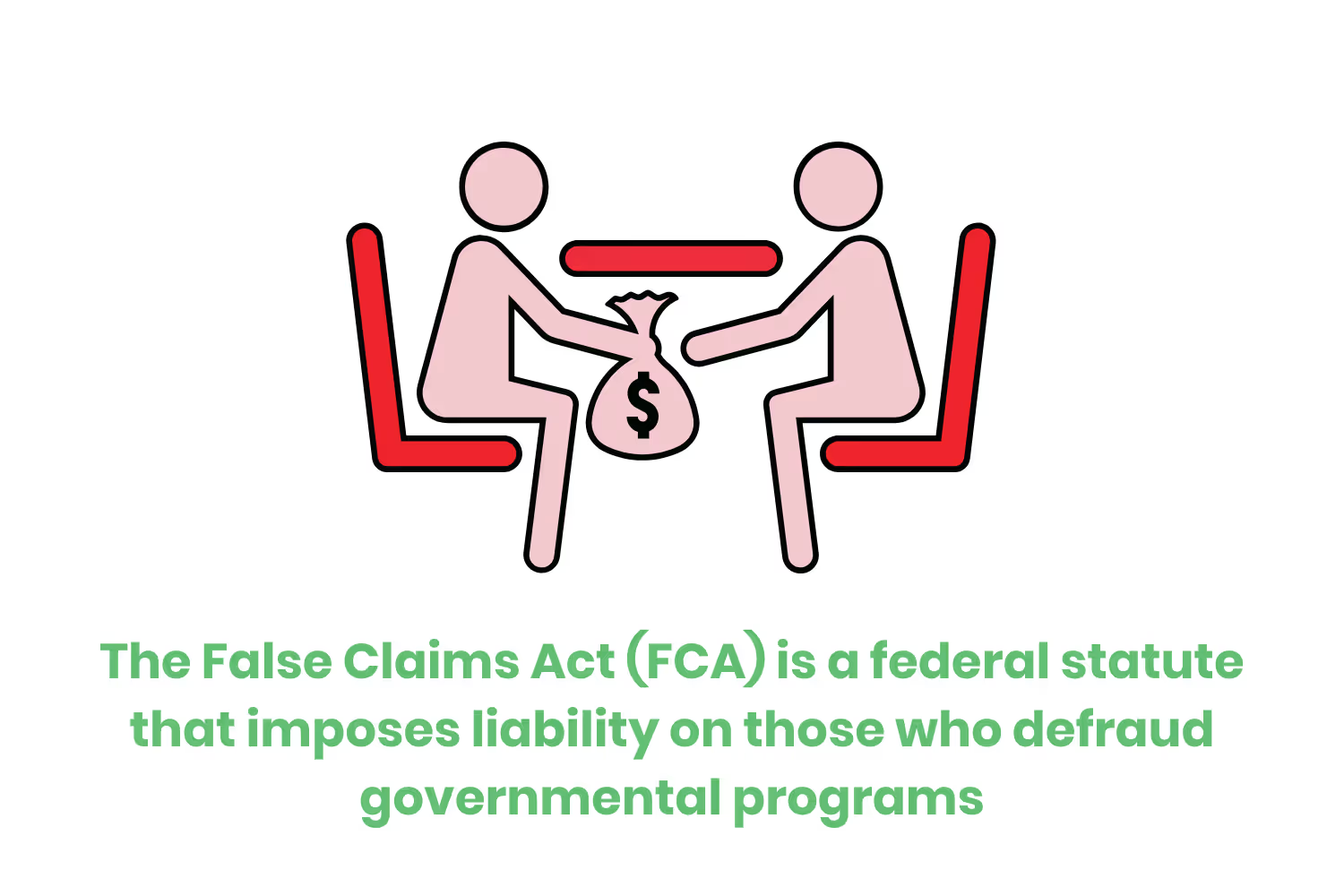
What Counts as a False Claim?
A false claim is the demand for money or property based on material falsehood or fraud.
Under the FCA, a person or company can be liable if they:
- Submit False Claims: If a person or company knowingly submits a false or fraudulent request for payment/approval to the government. Such as a healthcare provider knowingly submitting claims for services not rendered.
- Making False Statements: Intentionally creates or uses false documentation or statements which are necessary to secure government payment.
- Conspire to Defraud: Planning or carrying out any of the fraudulent actions listed under.
- Withhold Government Funds or Property: Has control over federal funds/property but delivers less than owed or required on purpose.
- Falsify Receipts or Certifications: Responsible for certifying government property and intentionally issuing documentation without checking accuracy. Done in an effort to deceive.
- Illegally Buy Government Property: Purchase or accept government-owned items from those who aren’t legally allowed to sell them.
- Avoid Paying the Government: Use false records or actions to avoid paying the government. Or underpay what you owe on purpose.
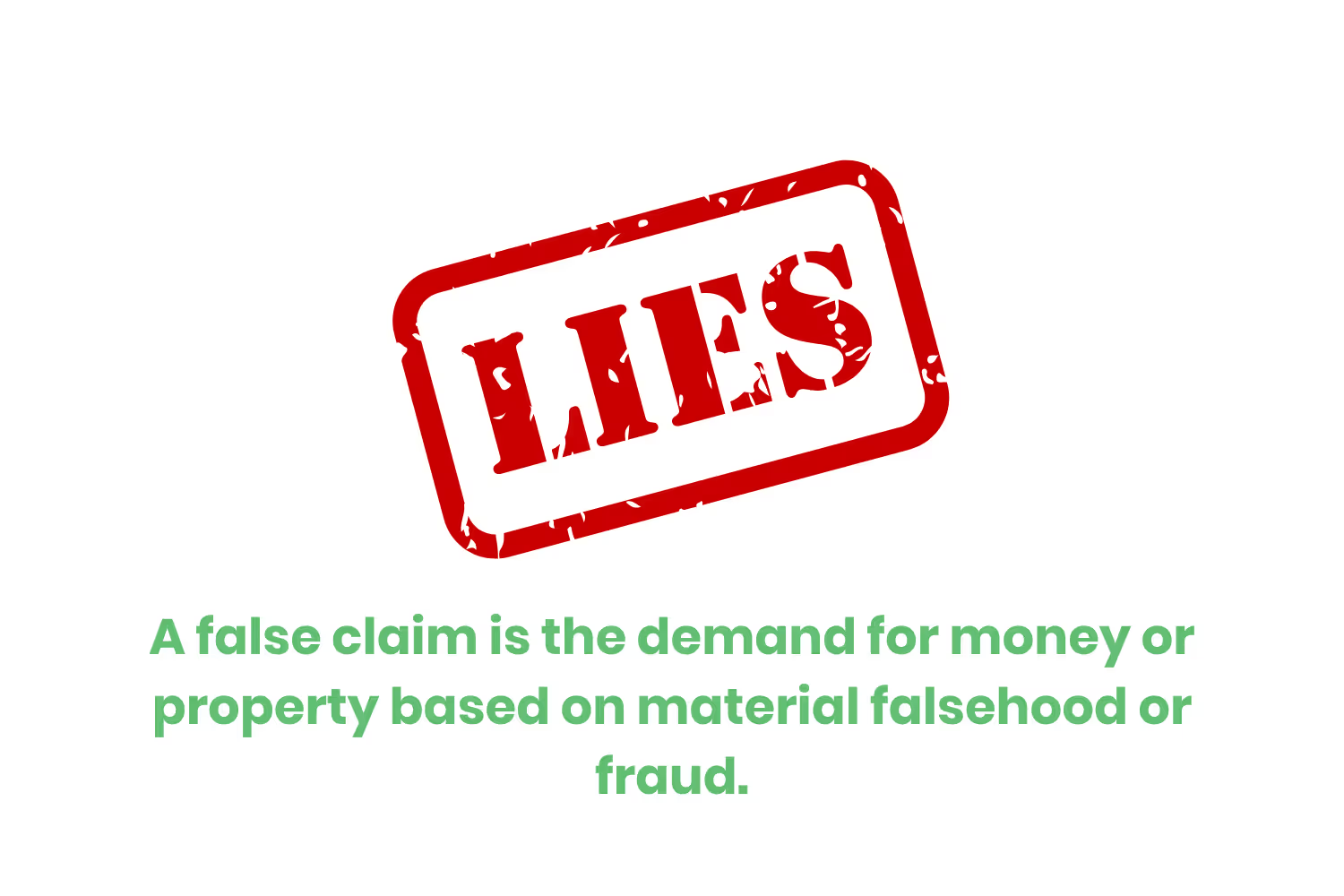
What are the consequences of violating the False Claims Act?
To violate the False Claims Act means facing civil penalties, criminal penalties, fines, and other consequences. No matter the type of false claim submitted, you’re looking at some kind of trouble. Whether you file with Medicare, Medicaid, or another government institution.
In fact, there have been companies that have had to pay millions of dollars in fines. Let’s take a look at some real-world false claims act settlements.
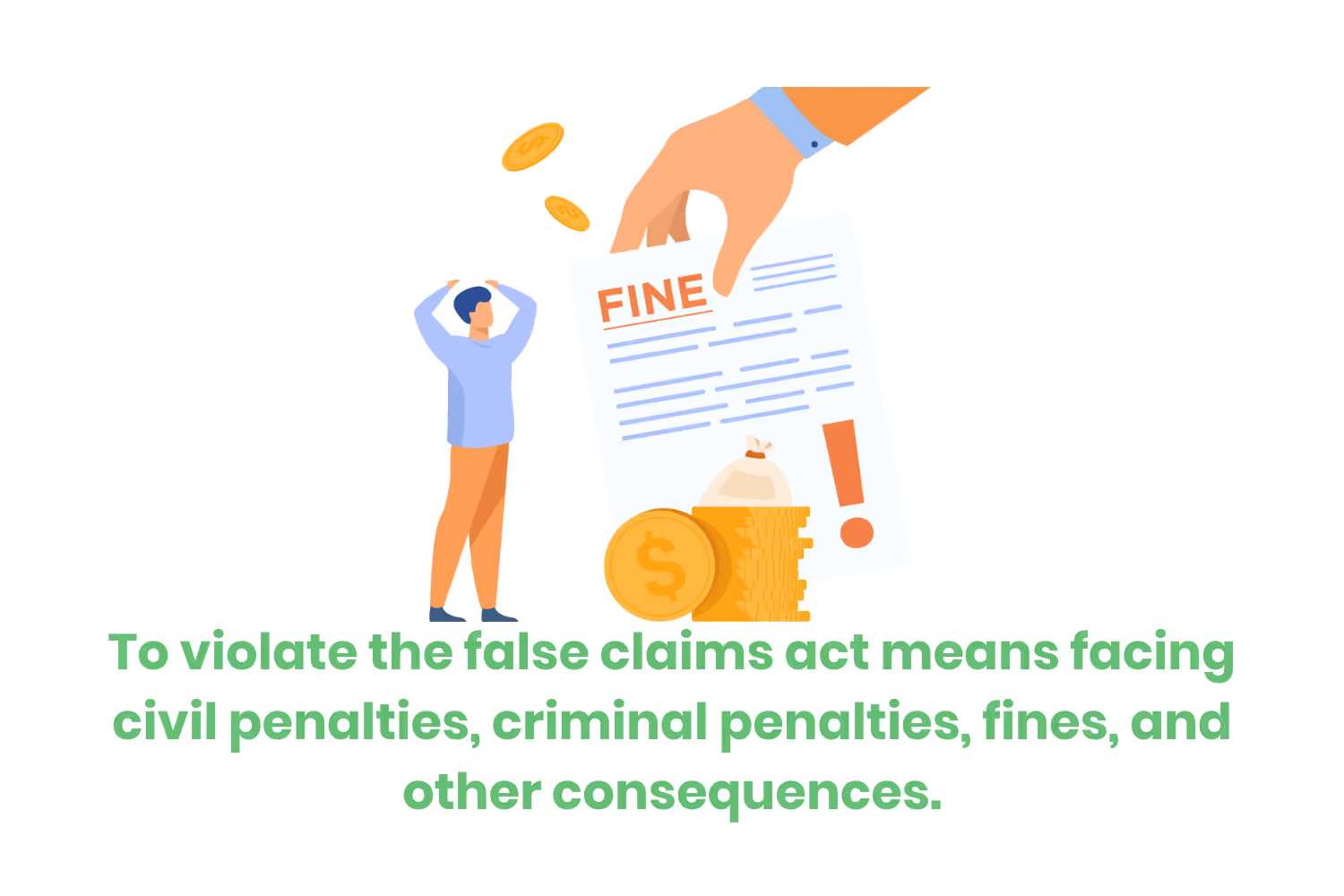
What are some examples of False Claims Act Violations?
Here are some examples of companies that committed fraud against the government and ended up in a settlement. Note that most instances listed consist of healthcare fraud as it is the most common:
- Arriva Medical LLC and Alere Inc.: Fined $160 million for overbilling a diabetic testing supplies company. Accused of submitting false claims to Medicare by paying kickbacks to patients. Also, billed for glucometers for deceased patients.
- St. Jude Medical: Knowingly sold defective medical devices and failed to disclose safety issues to regulators. Submitted false or fraudulent claims to Medicare and other federal programs. Settled for $27 million dollars.
- Mallinckrodt Pharmaceuticals: Knowingly underpaid Medicaid rebates for its drug Acthar Gel. The company misclassified it to avoid a larger payment. Settled for $260 million.
- Booz Allen Hamilton: This company improperly allocated indirect costs and failed to disclose cost accounting methods. They also mischarged commercial and international costs to government contracts. They settled for $377.45 Million.
I mentioned the term “kickback” in one of the examples of a False Claims Act violation. But what is a kickback? Kickbacks are illegal payments intended as compensation for “special” treatment. Otherwise known as bribery. This is a common issue in the health care industry specifically, even though the law prohibits it.
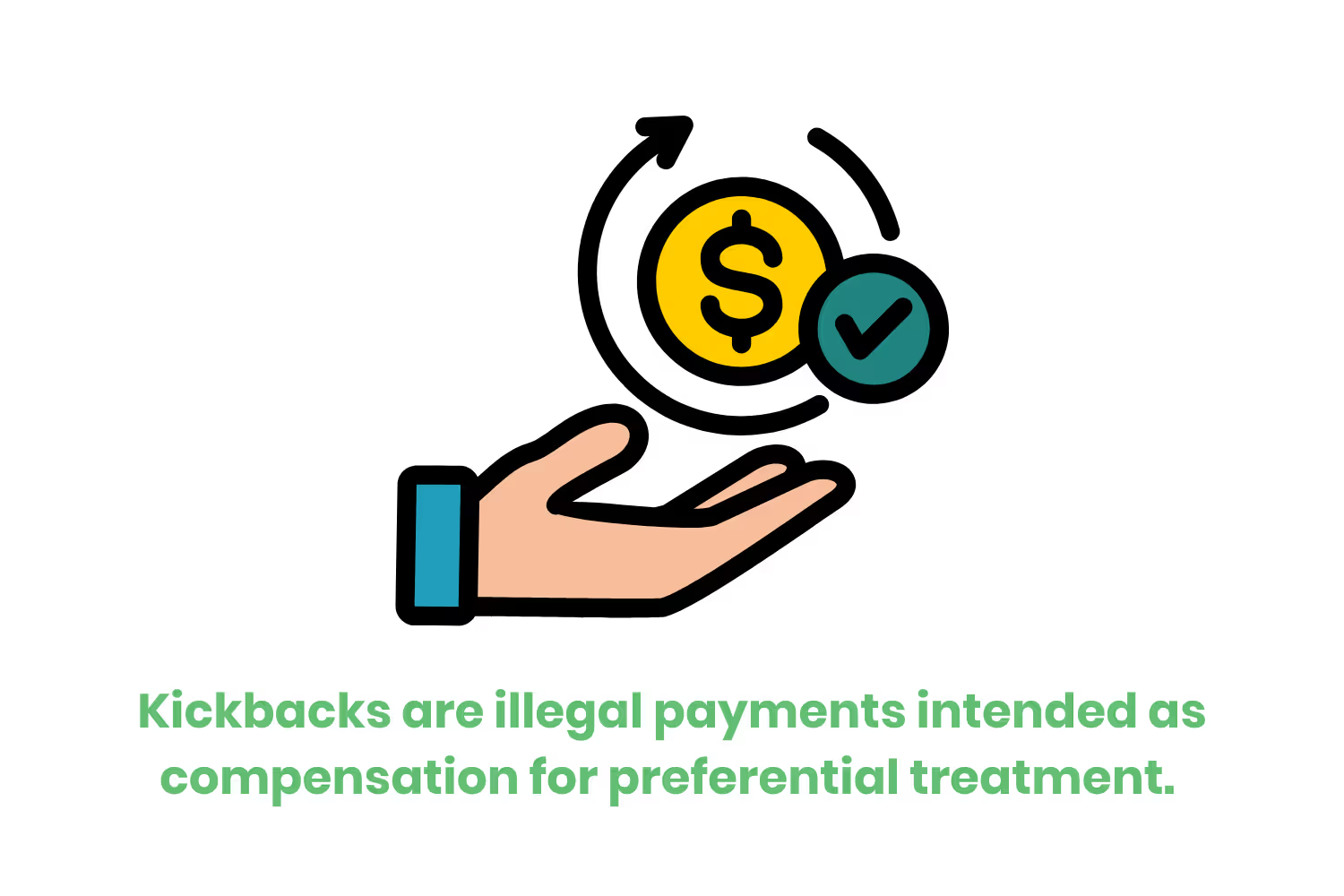
How does the Anti-Kickback Statue work with the False Claims Act?
The Anti-Kickback Statute (AKS) works hand in hand with the FCA by prohibiting medical professionals from accepting gifts or other incentives for making referrals or ordering prescriptions. Together they combat fraud and abuse in healthcare programs for medically unnecessary services.
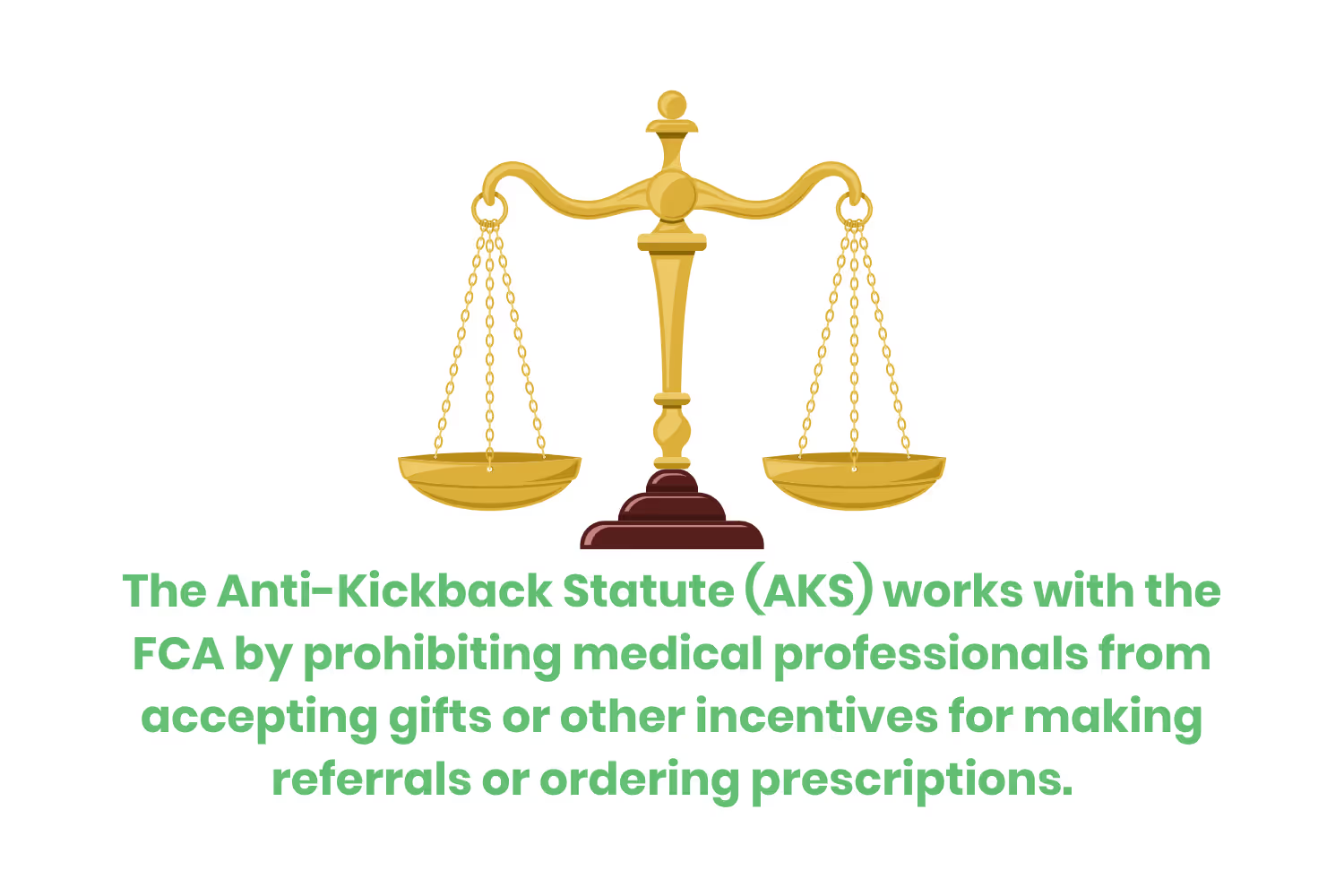
The AKS prohibits offering, paying, soliciting, or receiving anything of value in return for referrals. Because these referrals of patients will later on turn into payment from the federal government. When a doctor submits a false claim influenced by a kickback, the action then becomes a violation of the False Claims Act.
Under the Protection and Affordable Care Act, any claim related to kickbacks are false claims by filing.
How does the Physician Self-Referral Law (Stark Law) work with the False Claims Act?
In a similar vein, physicians referring patients to themselves can trigger FCA liability. The Physician Self-Referral Law (Stark Law) prohibits providers from referring patients to entities they have a financial relationship with. Under this law, these health services that are payable by Medicare or Medicaid cannot come back to line the referring doctor’s pockets.
If a health care provider violates this law, the claims submitted for the referrals are likely to be in violation of the False Claims Act (FCA).
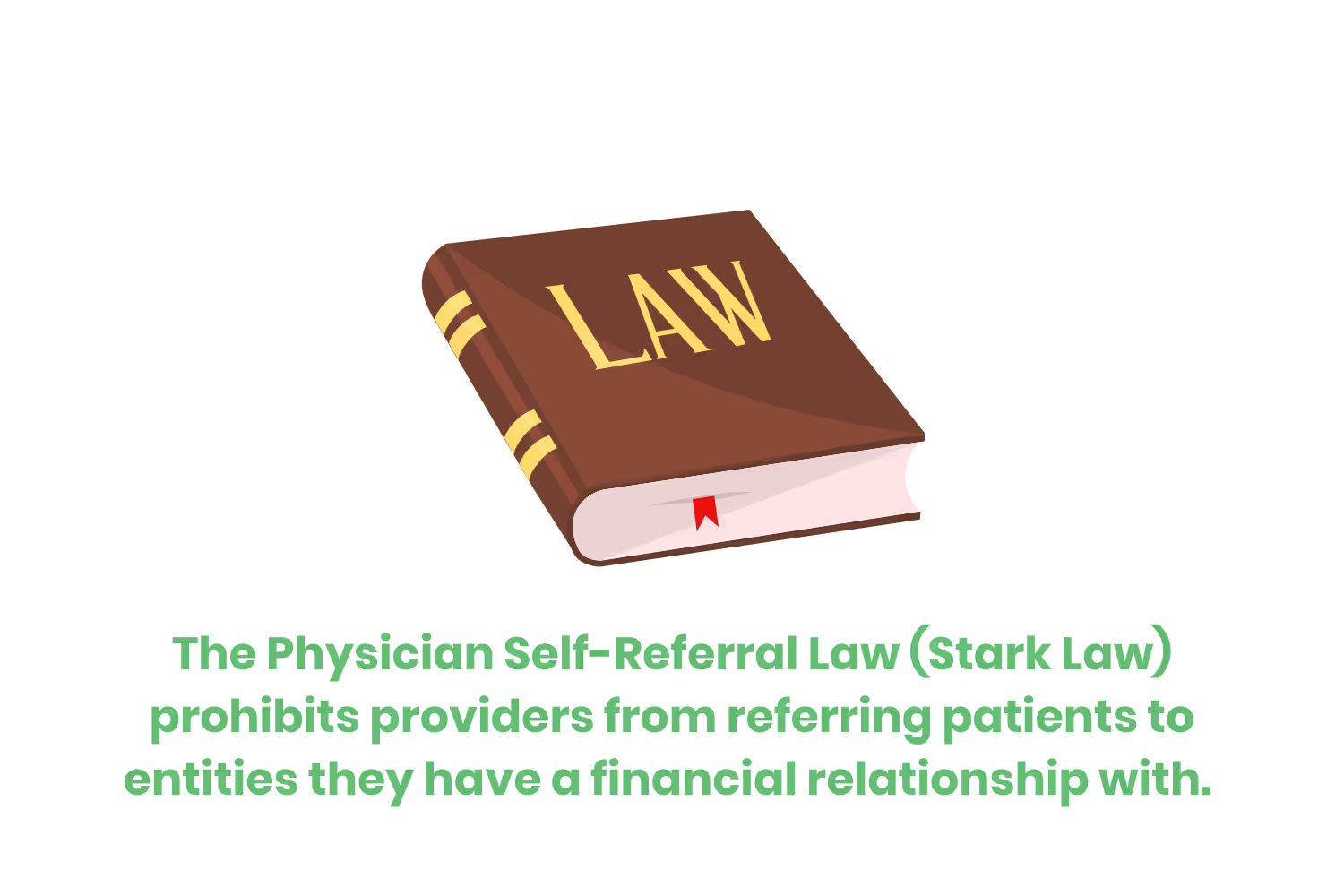
What role do whistleblowers play in False Claims Act cases?
Whistleblowers are usually the first to uncover false or fraudulent claims. They are an individual that reports evidence of wrongdoing in an organization. This can be an employee, someone in management, or even someone outside of the company. If that person sees misuse of government funds, they can file a lawsuit under the civil False Claims Act. These are qui tam cases.
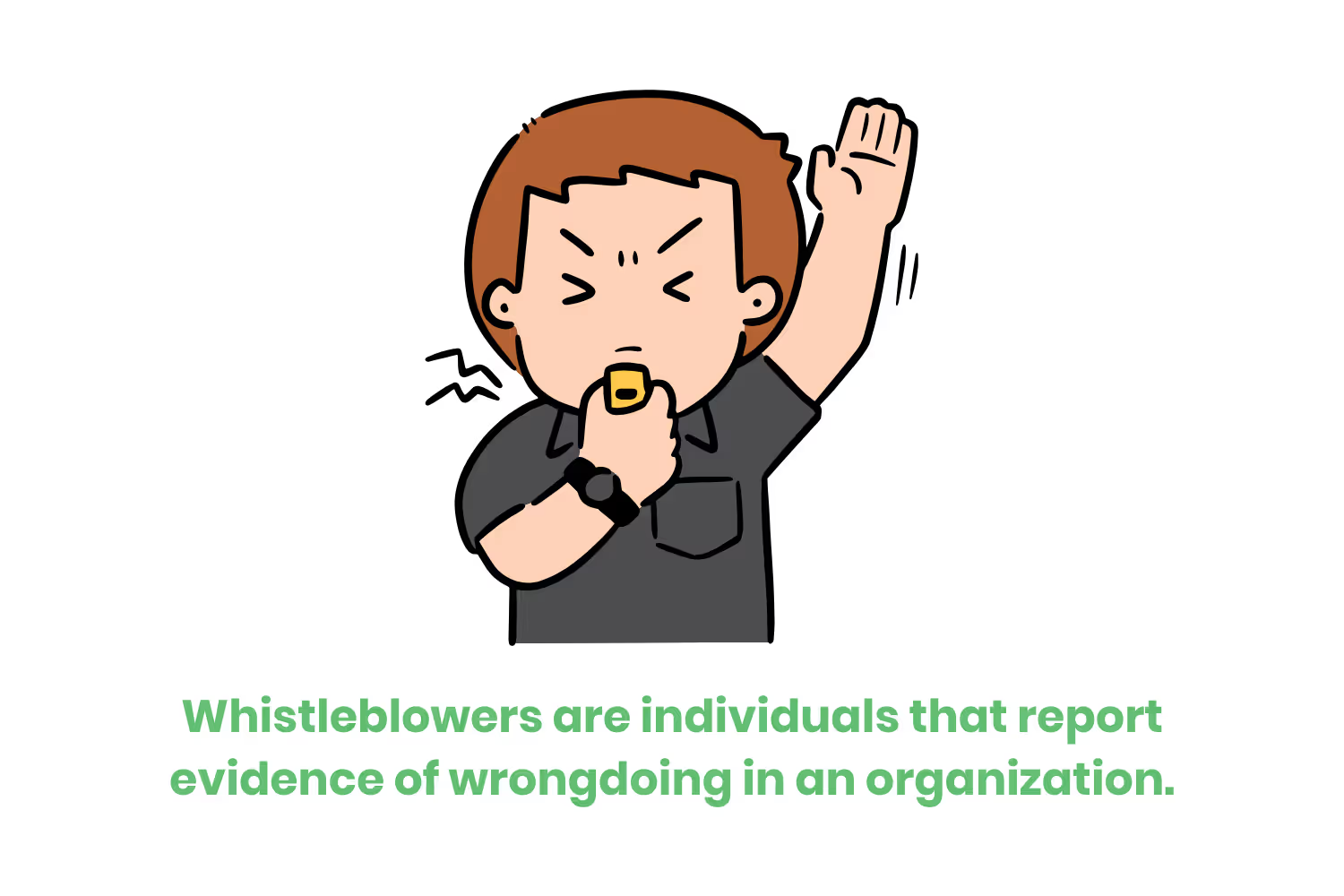
The qui tam provision of the False Claims Act encourages and rewards those who uncover fraud. Uncovering programs for medically unnecessary services and instances of wrongdoing is highly encouraged. The whistleblower law protects those who raise the alarm against retaliation. It also offers financial rewards if the case leads to act settlements and judgments reported by the DOJ.
How to Avoid Fines and Penalties
Avoiding a violation of the False Claims Act means your company needs to prioritize compliance. Education and transparency amongst your team is key. No matter what industry you are a part of, understanding that the False Claims Act also applies to a wide range of federal programs is important.
Improper billing practices and the submission of false claims can result in civil penalties, criminal penalties, or both. Even if they are unintentional. Penalties range from millions in claims act settlements and judgments to even jail time.
Having a compliance officer dedicated to using the False Claims Act framework in your organization is a great place to start. Train employees, conduct audits, and continue to make sure your billing practices are accurate.
Emphasize your product's unique features or benefits to differentiate it from competitors
In nec dictum adipiscing pharetra enim etiam scelerisque dolor purus ipsum egestas cursus vulputate arcu egestas ut eu sed mollis consectetur mattis pharetra curabitur et maecenas in mattis fames consectetur ipsum quis risus mauris aliquam ornare nisl purus at ipsum nulla accumsan consectetur vestibulum suspendisse aliquam condimentum scelerisque lacinia pellentesque vestibulum condimentum turpis ligula pharetra dictum sapien facilisis sapien at sagittis et cursus congue.
- Pharetra curabitur et maecenas in mattis fames consectetur ipsum quis risus.
- Justo urna nisi auctor consequat consectetur dolor lectus blandit.
- Eget egestas volutpat lacinia vestibulum vitae mattis hendrerit.
- Ornare elit odio tellus orci bibendum dictum id sem congue enim amet diam.
Incorporate statistics or specific numbers to highlight the effectiveness or popularity of your offering
Convallis pellentesque ullamcorper sapien sed tristique fermentum proin amet quam tincidunt feugiat vitae neque quisque odio ut pellentesque ac mauris eget lectus. Pretium arcu turpis lacus sapien sit at eu sapien duis magna nunc nibh nam non ut nibh ultrices ultrices elementum egestas enim nisl sed cursus pellentesque sit dignissim enim euismod sit et convallis sed pelis viverra quam at nisl sit pharetra enim nisl nec vestibulum posuere in volutpat sed blandit neque risus.

Use time-sensitive language to encourage immediate action, such as "Limited Time Offer
Feugiat vitae neque quisque odio ut pellentesque ac mauris eget lectus. Pretium arcu turpis lacus sapien sit at eu sapien duis magna nunc nibh nam non ut nibh ultrices ultrices elementum egestas enim nisl sed cursus pellentesque sit dignissim enim euismod sit et convallis sed pelis viverra quam at nisl sit pharetra enim nisl nec vestibulum posuere in volutpat sed blandit neque risus.
- Pharetra curabitur et maecenas in mattis fames consectetur ipsum quis risus.
- Justo urna nisi auctor consequat consectetur dolor lectus blandit.
- Eget egestas volutpat lacinia vestibulum vitae mattis hendrerit.
- Ornare elit odio tellus orci bibendum dictum id sem congue enim amet diam.
Address customer pain points directly by showing how your product solves their problems
Feugiat vitae neque quisque odio ut pellentesque ac mauris eget lectus. Pretium arcu turpis lacus sapien sit at eu sapien duis magna nunc nibh nam non ut nibh ultrices ultrices elementum egestas enim nisl sed cursus pellentesque sit dignissim enim euismod sit et convallis sed pelis viverra quam at nisl sit pharetra enim nisl nec vestibulum posuere in volutpat sed blandit neque risus.
Vel etiam vel amet aenean eget in habitasse nunc duis tellus sem turpis risus aliquam ac volutpat tellus eu faucibus ullamcorper.
Tailor titles to your ideal customer segment using phrases like "Designed for Busy Professionals
Sed pretium id nibh id sit felis vitae volutpat volutpat adipiscing at sodales neque lectus mi phasellus commodo at elit suspendisse ornare faucibus lectus purus viverra in nec aliquet commodo et sed sed nisi tempor mi pellentesque arcu viverra pretium duis enim vulputate dignissim etiam ultrices vitae neque urna proin nibh diam turpis augue lacus.




